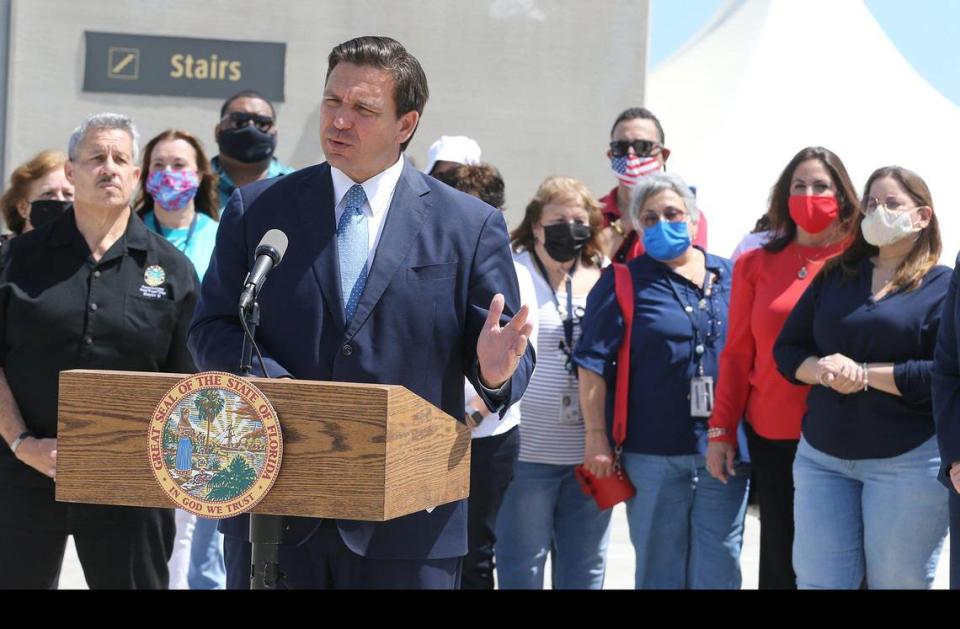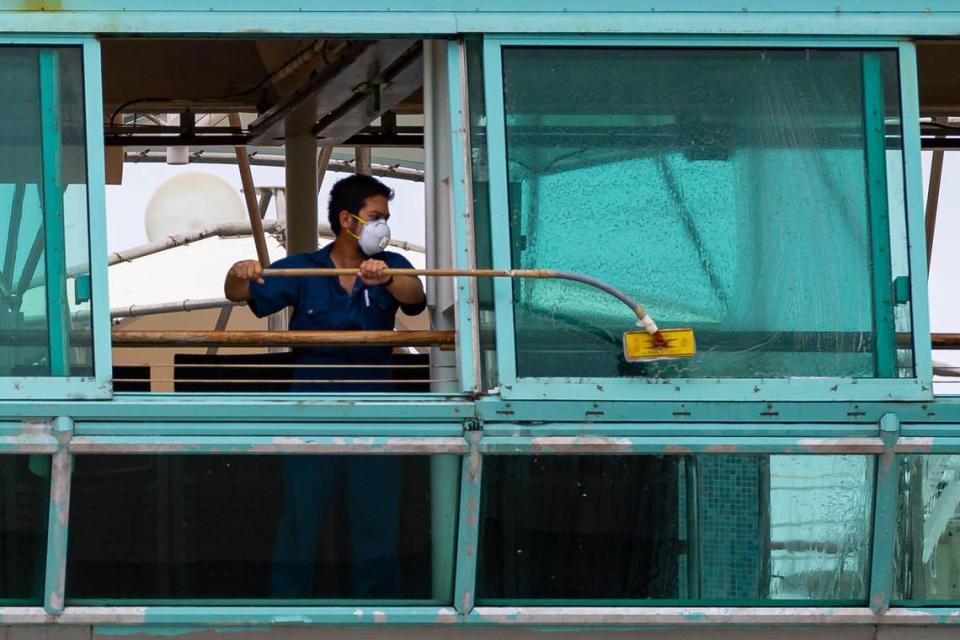Federal judge throws out CDC’s cruise safety regulations, handing win to DeSantis
- Oops!Something went wrong.Please try again later.
A federal judge threw out U.S. Centers for Disease Control and Prevention safety rules for cruise companies operating in Florida during the COVID-19 pandemic Friday, handing a victory to Gov. Ron DeSantis.
In a 124-page ruling, U.S. District Judge Steven Merryday of the Middle District of Florida said the agency’s “conditional sail order” — a framework of regulations dictating how cruises can restart in the U.S. during the COVID-19 pandemic — can remain in place for Florida cruises only until July 18, granting DeSantis’ request for a preliminary injunction while the full case moves forward.
After July 18, the rules will become non-binding recommendations for cruise companies as they are for other industries. The CDC has until July 2 to propose a more limited set of cruise regulations to the court.
READ NEXT: Florida’s U.S. senators want cruising to resume without government intervention
The decision comes as Royal Caribbean International’s Freedom of the Seas ship is scheduled to perform the first test cruise under the CDC’s restart plan from PortMiami on Sunday. The first cruise ship carrying paying passengers, Celebrity Cruises’ Celebrity Edge, is scheduled to depart from Port Everglades on June 26. No cruises have left U.S. ports with passengers since March 2020.
“Today’s ruling is a victory for the hardworking Floridians whose livelihoods depend on the cruise industry,” said Florida Attorney General Ashley Moody in a statement. “The federal government does not, nor should it ever, have the authority to single out and lock down an entire industry indefinitely.”

In a statement to media, Gov. Ron DeSantis said “the CDC has been wrong all along, and they knew it.” Calling the ruling “a victory for Florida families,” he went on to characterize the agency’s regulations as an overreach by the federal government.
The CDC published its conditional sail order in October, outlining four phases to get cruises up and running again amid the pandemic. Companies first had to expand COVID-19 testing capabilities on their ships and report weekly test results for crew members.
The agency waited five months to issue instructions for the second phase, requiring companies to secure agreements with ports and local health authorities in the U.S. cities they planned to visit. Final phases give companies two options to restart cruises: Ships that have 98% of their crew and 95% of their passengers vaccinated can restart without test cruises; others must conduct a two-day test cruise to ensure other COVID-19 protocols are preventing outbreaks.
Frustrated with the delay, DeSantis sued the CDC on April 8, arguing that the cruise companies should be able to resume cruises immediately without any CDC oversight. The state’s complaint said the agency is unfairly targeting the cruise industry by preventing it from operating since March 2020 and preventing Florida from collecting important tax revenue. The CDC argued it has broad authority to protect public health and regulate cruise business.
In Friday’s order, which applies only to cruises from Florida, Judge Merryday ruled that the CDC did not sufficiently justify the need for its cruise safety regulations, and that Florida has authority to sue the CDC in the first place because of “sufficient likelihood of continued economic harm” to the state caused, in part, by the regulations.

Regulations in the conditional sail order that require cruise companies to report cases of COVID-19 to the CDC are within the agency’s authority, Merrday’s ruling said. Other regulations — including a requirement that ships have COVID-19 testing labs, revamped ventilation systems and vaccination thresholds — are not.
Merryday called the CDC’s claim it has discretion to shut down a cruise because of COVID-19 transmission, “breathtaking, unprecedented, and acutely and singularly authoritarian” and compared it to a hypothetical shutdown of sexual intercourse nationwide to prevent the spread of AIDS.
The CDC has until July 2 to present Merryday with “a narrower injunction both permitting cruise ships to sail timely and remaining within CDC’s authority as interpreted in this order.”
CDC spokesperson Caitlin Shockey said the agency does not comment on litigation.
Rocky restart
The ruling is another jarring juncture in the already twisting cruise restart.
Many cruise companies have implemented vaccine requirements following the CDC’s recommendation that all cruise passengers be vaccinated. But some had to add caveats for Florida cruises this month when DeSantis insisted there would be no exception to a recently passed state law that bars businesses from requiring patrons to provide proof of vaccination.
Royal Caribbean International will require that passengers 16 years old and older be vaccinated on its ships leaving from all U.S. states, except for Florida, where the company will instead recommend that passengers be vaccinated. Its sister company, Celebrity Cruises, will require cruisers 16 years old and older in Florida to be vaccinated; those who don’t volunteer proof will be hit with extra restrictions and expenses.
Already the COVID-19 vaccine has proven essential to cruise ship operations. Last week, two passengers tested positive five days into an eight-day cruise on the Celebrity Cruises’ Celebrity Millennium ship in the Caribbean, even though all adult passengers and crew showed proof of vaccination. This week, eight crew members tested positive on Royal Caribbean International’s Odyssey of the Seas ship off Florida’s coast, less than two weeks since crew members on board were vaccinated. In response, the company pushed back the ship’s tentative restart date by nearly a month.
Paired with the already-confusing landscape of vaccine requirements, Friday’s ruling has the potential to turn cruisers away, said Larry Gostin, professor of global health law at Georgetown University and director of the World Health Organization’s center on global health law. Gostin previously said DeSantis’ lawsuit against the CDC had little to no viability because although the agency’s powers are not limitless, they are “at their zenith” when it comes to interstate and international commerce.

“I profoundly disagree with the judge’s decision,” he said. “If the CDC doesn’t have the opportunity to regulate cruise lines, it’s going to be very bad for the cruise line industry. No one wants to go on a cruise unless they have high confidence the cruise is safe.”
The CDC has to decide whether to appeal Merryday’s ruling to the U.S. Court of Appeals for the 11th Circuit or try to settle the case, said Bob Jarvis, a constitutional law professor at Nova Southeastern University. Jarvis previously called the lawsuit a “political stunt.”
Meanwhile, cruise companies will have to comply with the conditional sail order until July 18, when the regulations become recommendations, and they will get to choose which rules to follow and which to ditch. The CDC has used recommendations for other industries, including hotels and airlines.
But public health experts warn cruise ships are fundamentally different from other settings because they bring people together from all over the world for days at a time in crowded spaces with finite health resources.
“The evidence is overwhelming that cruise ships are among the highest risk environment, if not the most risky environment for COVID-19,” said Gostin. “CDC is not singling out cruise ships for special treatment, it’s trying to regulate a known hazard and making it safer.”
Spokesperson for Carnival Corporation Roger Frizzell said the company is in the process of reviewing the order. Spokespeople for Royal Caribbean Group, Norwegian Cruise Line Holdings, MSC Cruises, Disney Cruise Line and Virgin Voyages did not respond to requests for comment.
So far the CDC has approved at least nine ships for test cruises and four ships for revenue cruises.

